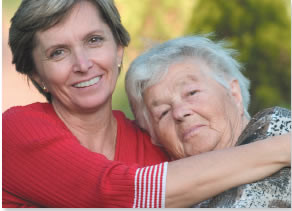
Driving with arthritis pain: Stay comfortable — and safe — behind the wheel

Daily cup of coffee may prevent afib recurrence

Gene-editing therapy lowers harmful blood fats in early study

What is EMDR therapy, and who can it help?

GLP-1 drugs versus bariatric surgery for treating obesity

Two dumbbells, three exercises, and 10 minutes

Easing the emotional burden of IBS

Modify your push-ups to meet your fitness level

What is long QT syndrome?

Stroke survivors may benefit from very low LDL levels
Mind & Mood Archive
Articles
Memory slips? Consider these seven common causes of forgetfulness
Ask these questions to get to the root of the problem.
Do you think you've been having more memory slips than usual lately? Annoying but essentially harmless age-related memory impairment is common, but pinpointing the cause isn't easy. Start by considering common and often reversible causes of memory problems. This could lead to a more productive discussion with your physician.
"Anyone concerned about memory should talk with a doctor for further evaluation," says Dr. David Hsu, a geriatric psychiatrist with the Center for Alzheimer Research and Treatment at Harvard-affiliated Brigham and Women's Hospital. "Having an honest discussion about memory and getting tested may help open up discussions about other areas of health too."
Vocabulary improves with age, research shows
Harvard researchers Joshua Hartshorne and Laura Germine have added to the growing body of research indicating that, in some respects, our cognitive function is improving, not declining, as we age. Their report, published online March 15, 2015, by Psychological Science, indicates that our vocabulary skills keep improving past retirement age.
The researchers wanted to understand how and when reasoning and memory change over the life span as a basis for distinguishing normal from abnormal aging. They recruited 48,000 volunteers of all ages and had them complete online tests that measured brain processing speed, memory, emotional intelligence, and vocabulary.
Listening to your favorite music may relax your arteries
Music has charms to soothe a savage breast, as the 17th-century poet William Congreve wrote. In fact, music might soothe your heart by relaxing your arteries, a small study hints.
Researchers measured arterial stiffness in 20 healthy young adults before and after they listened to 30 minutes of classical music, rock music, or nothing (as a control). They used a technique called carotid-femoral pulse wave velocity (PWV). This measures the time it takes for the pulse to travel to the carotid artery in the neck versus the femoral artery in the leg. Longer pulse times suggest stiffer arteries, which translates to a higher risk of cardiovascular problems. Higher "wave reflections" (another measure of artery health) are also linked to heart disease risk.
Tips to avoid caregiver stress
A number of strategies can help lighten the load of caregiving, such as delegating tasks to family and friends, using support services such as respite care, and taking some time for exercise and socializing. Image: Thinkstock |
Stay well when caring for a loved one by maintaining your physical and emotional health. Caring for yourself means you'll be able to care for another.
6 ways to use your mind to control pain
Meditation with guided imagery, which often involves imagining yourself in a restful environment, may reduce your need for pain medication. |
Relaxation, meditation, positive thinking, and other mind-body techniques can help reduce your need for pain medication.
Drugs are very good at getting rid of pain, but they often have unpleasant, and even serious, side effects when used for a long time. If you have backache, fibromyalgia, arthritis, or other chronic pain that interferes with your daily life, you may be looking for a way to relieve discomfort that doesn't involve drugs. Some age-old techniques—including meditation and yoga—as well as newer variations may help reduce your need for pain medication.
Distracting music may trip up older memories
Distracting background music could make certain memory tasks more challenging for aging brains, suggests a study in The Gerontologist. The study involved one group of participants ages 18 to 30 and another ages 60 to 75. They studied images of faces paired with names on a computer screen, either in silence or while listening to instrumental music. Later they had to recall the name-face pairs while listening to music.
The music had no effect on test scores in the younger people. In contrast, the older people remembered 10% fewer names learned when listening to background music, compared with studying in silence.
Lower stress, lower your blood pressure
You can't see your blood pressure or feel it, so you may wonder why this simple reading is so important. The answer is that when blood pressure is high, your heart is working overtime to pump blood through your body. This extra work can result in a weaker heart muscle and potential organ damage down the road. Your arteries also suffer when your blood pressure is high. The relentless pounding of the blood against the arterial walls causes them to become hard and narrow, potentially setting you up for stroke, kidney failure, and cardiovascular disease.
A healthy lifestyle — not smoking, losing excess weight, eating nutritious foods, and exercising regularly — is the cornerstone for preventing and treating hypertension.
Retirement stress: Taking it too easy can be bad for you, too
Men need to be challenged to be healthy in mind and body.
It might seem like retirement is a time to take it easy and devote yourself to gardening, golfing, and napping. But don't take it too easy, say Harvard experts. An absence of challenges can have the same effect as too much stress, compromising your physical and mental health. For optimal well-being, you need to stay engaged—with your own interests as well as with other people.
Review finds no sign of memory loss from statins
The best-quality evidence available does not prove that taking a statin can cause memory loss or other changes in mental functioning, according to a review in the Journal of General Internal Medicine. Since 2012, the FDA has required that statin manufacturers include a warning on drug packaging that statins could impair mental functioning, but this has been controversial. Researchers took a look at the published evidence for possible mental side effects of statins.
The new review covered randomized clinical trials involving nearly 47,000 people. Such trials are the gold standard in medical research. These included 23 trials in which researchers explicitly measured mental functioning, as well as trials that kept track of mental changes reported by participants.
New concerns about anticholinergic medications
Anticholinergics, a group of medications that includes many over-the-counter and prescription drugs, are well known for causing confusion in older adults. Common medications with anticholinergic properties include medications to treat overactive bladder, such as oxybutynin (Ditropan); medications to treat allergies and sleeping problems, such as diphenhydramine (Benadryl, Sominex, Unisom); and medications used to treat depression, such as amitriptyline (Elavil). It's generally believed that confusion that may develop from anticholinergics clears up when someone stops taking the drugs. But now it appears that the medications are associated with a more permanent effect. A study published online Jan. 26, 2015, in JAMA Internal Medicine linked daily anticholinergic use among older adults for three or more years to an increased risk for developing dementia and Alzheimer's disease.
The study didn't prove that anticholinergics cause dementia; it only found an association between people who take the medications and people who develop dementia. Nevertheless, the researchers suggest that doctors avoid prescribing anticholinergics when possible, or at least limiting the medications to the lowest doses possible. If you're taking an anticholinergic, talk to your doctor about the risks the medication poses, including the risk of falls as a result of confusion.

Driving with arthritis pain: Stay comfortable — and safe — behind the wheel

Daily cup of coffee may prevent afib recurrence

Gene-editing therapy lowers harmful blood fats in early study

What is EMDR therapy, and who can it help?

GLP-1 drugs versus bariatric surgery for treating obesity

Two dumbbells, three exercises, and 10 minutes

Easing the emotional burden of IBS

Modify your push-ups to meet your fitness level

What is long QT syndrome?

Stroke survivors may benefit from very low LDL levels
Free Healthbeat Signup
Get the latest in health news delivered to your inbox!
Sign Up








